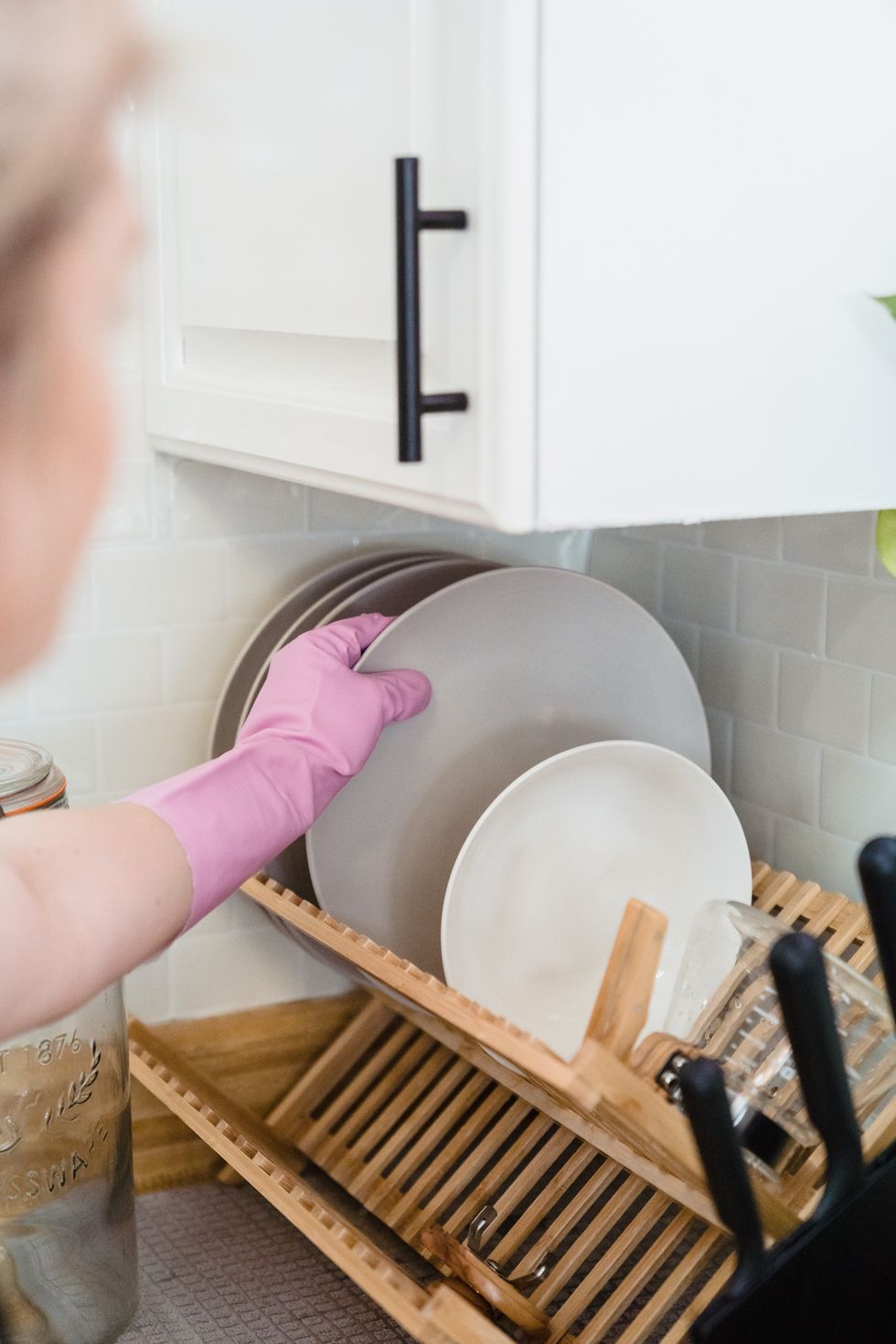Moving in together poses its own set of challenges. Here's how to tackle them.
How To Cohabitate With A Partner... Without Absolute Chaos Ensuing

Meredith Holser is the Shopping Editor at Brit + Co, covering everything from seasonal fashion trends and the best grocery finds from Trader Joe's to shoes actually worth splurging on and life-changing beauty products. Outside of work, you can catch Meredith hiking, trying new recipes, and dreaming about having a yummy little treat.
When it comes to cohabitating, the number of married adults in the U.S. surpasses that of unmarried cohabiting couples, but research shows that might not be the case forever. 59% of adults ages 18-44 have cohabited with a partner *at some point* in their lives according to the Pew Research Center, suggesting its growing popularity among young individuals in relationships.
Like all things change, our collective perception of relationships and marriage has certainly changed – research suggests a “general downward trend for marriage” in favor of… anything but. Divorce, cohabitation, living the #SingleLife, having kids out of wedlock, or simply *not* having kids have all become more prevalent lifestyle choices, thanks to shifting attitudes. Marriage is an uninteresting and “less necessary” option to many.
There’s a little more to the rise of cohabitation than a simple evolution in thinking. The economy has pushed couples to choose the most convenient option – living together – due to rising costs of living and the slow erasure of affordable housing. More contemporary outlooks on work have also contributed to the appeal of cohabitation.
Relationships alone can be a real challenge. Living together just adds yet another layer of hard work in order to nurture the connection between you and your partner. So, if you’re currently embracing all of the intricacies and unique teachings cohabitation brings – and want to know how to cohabitate better – we have your back. Read on for what tips experts have about cohabitation and how to thrive, alone and together, while living with your other half.
How do you know when you are ready to move in together?

Photo by SHVETS production / PEXELS
Looking for signs of readiness within yourself and from your partner is one of the most effective ways to know if you both are ready to move in together, according to Boston-based psychotherapist Angela Ficken, LICSW.
“Signs of readiness may include open communication, shared values and goals, financial stability, and a solid commitment to the relationship,” Ficken suggests. “On the other hand, feeling uncertain about long-term compatibility, unresolved conflicts, or a desire for personal space and independence might suggest someone is still being prepared for cohabitation.”
It can be easy to get caught up in all of the positive signs of readiness from you and your partner, though, which is why Dr. Jess O’Reilly, ASTROGLIDE’s Resident Sexologist, stresses the importance of acknowledging the common misconceptions about cohabitation before moving in together.
“Many people also assume that living together will be easy if they love (or like) each other, but liking and loving don’t necessarily amount to compatibility when it comes to cohabitation,” says O’Reilly. “Another misconception involves the belief that you must live together in order for the relationship to progress. This simply isn’t true. You can have loving, meaningful, fulfilling relationships of all kinds — intimate, romantic, sexual, close in proximity, long-distance and otherwise. Some people prefer to live apart for practical reasons and this doesn’t mean that they’re not committed or fulfilled.”
Cohabitation doesn't *always* guarantee a successful or lasting relationship. Whether you’re living with your partner or not, maintaining clear communication and effort from both sides is crucial for a healthy situation.
Some quick tips for preparing for cohabitation include:
- Have open (and honest!) conversations about expectations, responsibilities, and boundaries with your partner.
- Discuss financial matters, including how expenses will be shared or split, and consider creating a joint budget, if necessary.
- Plan, decorate, and organize your living space together, ensuring it suits both partners' needs and preferences.
- Prioritize effective communication and conflict resolution skills at all times, even before cohabitating.
- Discuss long-term goals, values, and plans for the future to ensure alignment between you two.
- Observe how your partner handles responsibilities, respects boundaries, and demonstrates a willingness to work through challenges and take the results into account.
Tips For Communicating While Cohabitating

Photo by Uriel Mont / PEXELS
As you’ve likely heard no less than one million times before, healthy communication is the foundation of a healthy relationship. Experts agree, but *actually* communicating can be so much harder to act on, rather than just thinking about it.
“Before [addressing] communication skills, it’s worth considering your beliefs about what’s right. Oftentimes, we fight about household issues because we believe that what we want is objectively right,” O’Reilly says. “It may be reasonable for you to want the bathroom cleaned once a week, but that doesn’t mean that it’s important to someone else. So first, we need to consider the fact that what we want may not be what someone else wants.”
The differences between you and your partner are exactly what make your relationship stronger, so holding them close and viewing them as positives can help facilitate healthy communication. But knowing them means nothing if you don’t know yourself, suggests Kara Kays, LMFT with Thriveworks Colorado Springs.
“Learn yourself,” Kays stresses. “It is difficult to communicate effectively if you’re struggling with self awareness, emotion identification and regulation.”
More ways to improve communication while cohabitating include: active listening, expressing your feelings and needs despite any fears, using "I" statements, practicing empathy and understanding at all times, and engaging in scheduled check-ins.
Managing Housework And Chores With Your Cohabitating Partner

Photo by Liliana Drew / PEXELS
When you cohabitate with a partner, you and even your smallest habits are fully exposed. Cleaning and housework habits are oftentimes the most visible, and are a common root of conflict between partners that live together.
Maybe you’re the type to turn a blind eye to the sink full of dishes out of low motivation, or you simply don’t care to make the bed every morning. Your partner could hold an entirely *different* attitude about these seemingly minute household chores, though, and it’s important to see things from their side.
“Living together means knowing, seeing, and being subject to each other's habits,” says Kays. “Develop space and time to learn these habits, accept what you can, and communicate about the things you cannot. But, be ready for your partner to share concerns as well – even if you don't see anything wrong with your behaviors.”
O’Reilly acknowledges that conflicts surrounding a shared clean space doesn’t just stem from the division of labor, but also relate to personal values and relational issues (do they really care about me if they’re not respecting my requests or values with regard to cleanliness?). These factors could foster “frustration, conflict, and eventually resentment” when not considered in the day-to-day.
Positive and understanding communication can help you and your partner get ahead of potential fights about who’s taking the trash out. O’Reilly offers some questions to ask yourself and each other:
- What tasks are important to you?
- Which ones do you tend to avoid?
- How can you ensure that you both feel appreciated and respected?
- How might you consider dividing tasks and checking in when you feel the division isn’t equitable?
How To Handle Finances With Your Partner

Photo by Moose Photos / PEXELS
Money is really never out of the question when cohabitating, and learning to manage finances alongside someone else when you’ve become accustomed to managing your own can be a big adjustment.
“Transparency and fairness are key in financial arrangements,” offers Ficken. “Couples must establish open and transparent communication about financial expectations, create a budget, and determine a fair and equitable way to share expenses based on individual circumstances.”
There’s actually no real wrong or right way to handle money with your partner – as long as the arrangement works for the two of you, and you both are committed to the upkeep, things should go smoothly.
Kays suggests setting time aside with your partner to plan out finances at the beginning of the cohabitation period and throughout the time you live together.
“Make a plan together on how this time will be spent, and do your best to stay on track,” she says. “Holding a state of the union meeting about finances can go a long way in the exploration of what to spend money on, how much the weekly budget is, who is able to take more or less. When these areas are not set out in clear expectations, conflict can arise.”
Independence vs. Interdependence – Why It's Crucial For A Cohabitation Situation

Photo by Monstera / PEXELS
It’s not unheard of to feel like you’re losing (or have already lost) yourself in the midst of living with your partner. After all, you care about them deeply. But the desire to be side-by-side with them at all times in an effort to not miss out can halt your potential for individual growth. So how can you and your partner work together towards independence (and ultimately, healthy interdependence)?
“Live your own life,” says O’Reilly. “Don’t ditch friends or quit activities just because you move in with someone. You don’t have to do everything together and you can still maintain a degree of independence without checking in with them on every plan.”
And she’s *so* right – though most of us wouldn’t get by without depending on each other, independence is a crucial first step before living with someone.
“Growth individually and together does not, or rather, should not stop when cohabitation starts. Growth together can be accomplished by having meaningful, deliberate conversations about areas of strife as well as areas of excellence,” says Kays. “Growing individually means taking time to be yourself, enjoy your hobbies, build an inner understanding and self awareness.”
So, don’t hesitate to carve out that time for yourself, and encourage your partner to do the same.
“Working through a flow of togetherness and separateness may take time,” Kays offers. “Continuing to find time for self-care, friendships, and hobbies will make time together that much more effective.”
Cohabitation's Effects On Sex And Intimacy

Photo by Pixabay / PEXELS
The “dead bedroom” is undoubtedly a real thing, even outside of marriage. You’re often in close quarters with your other half when cohabitating, and many expect this closeness to lead to more sex – when in fact, it can lead to less sex or no sex.
“Proximity breeds familiarity, which can erode away at passion, excitement, and desire,” says O’Reilly. “[Your partner] becomes more familiar and predictable. They also begin to play multiple roles beyond the lover — roommate, confidant, friend, support system, business partner, and more. This can detract from desire, as you no longer see them solely as an object of your desire.”
Stress also contributes to declining sexual intimacy while living together, whether it’s coming from inside the relationship or from external things like work, friends, and money.
“For many people, stress detracts from desire and pleasure,” says O’Reilly. “When cortisol spikes, it can heighten tension and increase the likelihood of conflict. It can also detract from sensuality and feeling connected to your body — you’re focused on survival as opposed to pleasure.”
Not all is lost, though, if you’re feeling disconnected from your sexual self and your partner. Learning to manage stress can alleviate tension in the bedroom. O’Reilly even suggests creating some distance, risk, and mystery into your relationship to counteract familiarity and predictability.
“If you continue to explore, remain curious and peel back the layers to learn more, you can revive desire and passion,” she says. “This might include trying new things (like role playing, dirty talk, fantasy exploration, toys) or simply changing the way you flirt and interact on the daily.”
More than anything, it’s important to maintain an open thread of communication when easing into how to cohabitate. Having this skill in your relationship toolkit will make managing sex, money, chores, and more together *so* much easier.
“Cohabitation can be fun and exciting,” says Kays. “It allows for a relationship to develop in a new area, learn from each other in a new way, and grow, hopefully, in the same direction.”
Sign up for our newsletter for more on relationships!
Header photo by Danik Prihodko / PEXELS
Some quotes have been edited for clarity.



















